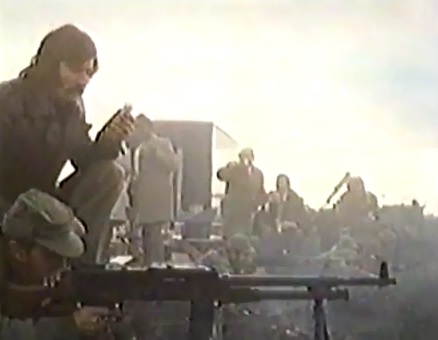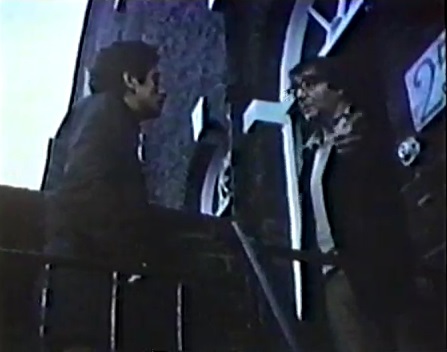Our
Old Car
John
Nesbitt’s Passing Parade
The automobile,
lovingly examined from the horseless carriage to the postwar sedan.
The
Underworld Story
The title is a
gag at first, reporter leaks story of mob testimony, gangster rubbed out,
reporter fired.
He cashes in on
the favor and buys into a small New England paper. A murder takes place,
another chance to cash in.
The victim is a
publisher’s daughter-in-law, his worthless son killed her. A Negro maid
is suspected.
Efforts are made
to silence the reporter, the gang boss now has a hold on the publisher as well.
A typically
brilliant, profound, complex work by Endfield. Bosley Crowther didn’t
stay to see the reporter a hero in spite of himself, but wrote that as far as
he and his colleagues on the New York Times were concerned, the picture
stunk likewise.
And that went for
Wilder’s Ace in the Hole a year later, too.
The Limping Man
The surrealist
construction is signed at the end S. Freud, practically, but not even that
clued the critics in.
A man has nightmares that his girl has gone to the
bad in his absence, the anxiety is embodied as a man with a limp and a crutch
that fires bullets.
This takes place in London, he’s a Yank who was
there in the war. The crew of the plane he travels in from New York figure just
as importantly as the man sitting behind him.
In short, a masterpiece quite unknown and a couple of
very droll songs for good measure, “Hey Presto!” and “I
Couldn’t Care Less”, the latter with lyrics by the director under a
nom de guerre, Hugh Raker.
The picture is signed Charles de Lautour (not de la
Tour), for reasons that have nothing to do with movies.
Hell Drivers
To appreciate
Endfield’s masterpiece, you have to have been driven down by some
underpaid heavy-footed flunkey in a truck of many tons, or by some other
metaphorical flunkey whipped on to take the place of any motorist on the road.
Benjamin Franklin’s autobiography is good
source material for the ten-ton lorry drivers toting gravel at high speed on
English roads come death or damnation to shave an extra profit for the boss and
his pacesetter.
All of the construction merely serves this point, a
nicety not observed by Variety.
The screenplay and direction by Endfield exercise the
American style in Britain, with Raoul Walsh’s They Drive by Night in
mind. The action, details and dialogue are closely observed, and the cast is
very deep.
Zulu
Ichikawa’s The
Burmese Harp and Curtiz’ Casablanca effectively govern the
transition to a successful parry. Two young English
officers, an aristocrat and an engineer, conduct the defense of an isolated
Army post against forty times their number, on the afternoon that follows the
defeat depicted in Douglas Hickox’s Zulu Dawn, and during the
night and next day.
This musical
theme, advanced late in the film after careful preparation (the visiting
engineer has no mind for his colleague’s singing Welshmen), is one of two
or three strands skillfully woven into the fabric of the screenplay as filmed.
Milestone’s Mutiny on the Bounty gives the foppish officer and
hunting gentleman, Lean’s The Bridge on the River Kwai the
engineer put to a redoubt.
The subtlety of
this magnificent production is matched by its openhandedness, nothing is veiled
from the camera, on the contrary, the utmost skill is absolutely deployed to
make matters plain in all respects, even if a mere look conveys the truth at a
moment, which makes a review like Canby’s quite a tribute in its way. The
filmmakers have withheld nothing, the New York Times beheld nothing.
Sands of the Kalahari
“Power
comes from the point of a gun,” the view of a poetaster.
Locusts crash a
chartered flight in the desert, a hunter among the survivors sets about killing
the rest.
Primitive man, at
last, no better than the apes.
De Sade
The acceptable
tradition belies him, and this is easily represented with Biblical simplicity.
An arranged marriage to the sister of the girl he loves is sufficient.
There is a wicked
uncle, another influence.
These two
arrangements, social and ęsthetic, exercise a form of critique and constraint
that does not correspond to reality, hence the requirement of a truth, however
brief, that would answer the perception.
Already several
lines of French philosophy and thought are evident, the peculiar sarcasm and
venom in certain stanzas of Baudelaire as well, and a certain despair that is
actually a ceaseless hope, as represented.
Nicholson-Arkoff
for Universal-International, screenplay by Richard Matheson, sumptuously filmed
on location.
At the same time,
the style is rather crude by comparison for example with Il Casanova di
Federico Fellini, and this is in keeping with the subject’s literary
compositions.
The structure is
indeed remarkable and highly elaborate, the main point of interest, something
more than a reminiscence in old age, with a distinctly circular form indicated,
a vicious circle if you like.
The
representation of the subject’s mind is practically the entire work,
there is only a very brief scene just before the end in which the present is
perhaps shown, a very old man conversing with a nun in his cell.
One feature of
this representation is a curious allusion (with Keir Dullea) to Kubrick’s
2001: A Space Odyssey, young De Sade several times encounters his aged
self without recognizing the personage.
There is a prime
example here for some of Russell’s films, he and Fellini and Endfield
have in this conjunction a quite sizeable lack of critical response in common.
Universal Soldier

The London bobby
on airport duty (cf. John Ford’s
Gideon of Scotland Yard). The professional of the title amongst other ordnance on
the open market internationally. “People? Come
on, you know what happens to people in revolution, they just get shot.”
Cf.
William Friedkin’s Deal of the
Century, Richard Lester’s Cuba,
Alan Bridges’ The Shooting Party for the “stupid dog”.
To a London
cabbie, “listen, where do you find some people round this town, I mean—where they live?”
“Oh, I know
what you mean, sir, gentlemen more like yourself.”
“Oh yeah,
more or less.”
“Portobello
Road.” The director as more or less himself (Scranton, Yale, “the
dirty palms and the smog of Los Angeles”), married to Germaine Greer in “the
bliss of England,” letting rooms to the fellow. A theatre group on arms
and the mask, a political meeting with its Irish up, a walk in the park with
runners (cf. Orson Welles’ The Stranger), something like Basil Dearden’s
Pool of London for the transfer point. Hothouse flowers, a rainy rock concert. The landlady’s
stepdaughter, Yogananda, “hah... oh, shit,” foggy Frisbee... loose
cannons, a king’s ransom. Keaton’s Cops and the evident wellspring, Peckinpah’s The Wild Bunch.
TV Guide,
“fairly intelligent, if overly grave.” Halliwell’s Film Guide, “solemnly meaningful”.
